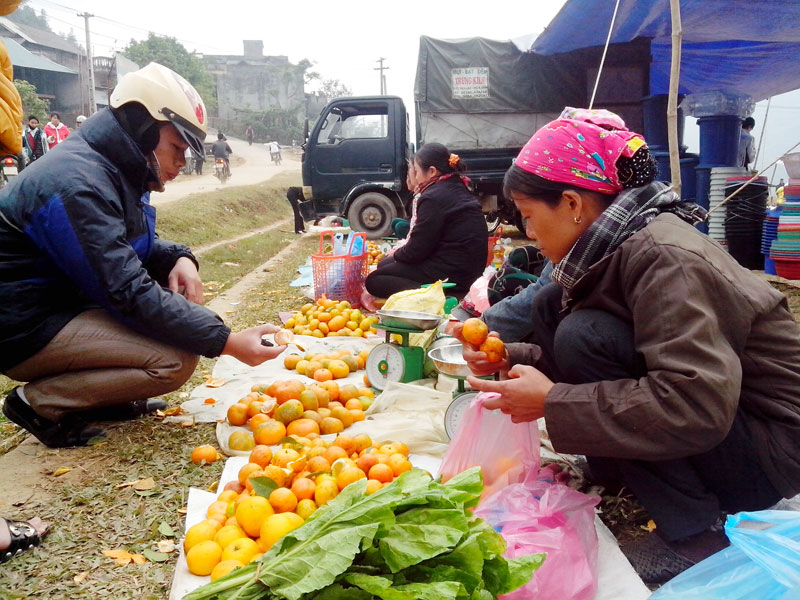
(HBO)- Highland fairs in commune at the end of the year are exciting and busy. This is the center of the 5 highland communes of Tan Lac district, so every market people from different parts of the communes are always taking part. Rearranging the goods for the market, Ms. Bui Thi Nga living in Bac Son commune happily says: "In the past, there were all dirty land roads in these communes. It was very difficult hard to travel. Now there are asphalted roads and people travel to work by motorbike, they do not have to walk any more. People go straight to the market or upland field. Thanks to the roads, many families in my commune have escaped from poverty due to selling goods they have made.
 \
\
Thanks to the convenient transportation, people in Nam Son commune (Tan
Lac) bring tangerines favored by customers to Lung Van market to sell.
Back to the road to the upland communes such as Quyet
Chien, Ngo Luong, Lung Van, Nam Son and Bac Son, people’s lives are prospering.
Starting from the key crop of maize to reduce poverty, the people boldly
restructured plants bringing some high-value plant varieties into production,
typically chayote trees, sweet tangerines and purple garlic ones. Ms. Dinh Thi
Quyet, the chairwoman of the Quyet Chien Safe Vegetables Cooperative says that
the convenient roads have made it much easier for the people to consume
vegetables. A lot of the households have expanded the area of growing chayote
and other vegetables. Now every day, there are three to four trucks carrying
vegetables there to Hanoi and other provinces to consume.
In the
past year, the State has upgraded and repaired narrow parody road sections,
which are out of sight. As a result of this, the roads to the upland communes
of Tan Lac district is smooth and have limited the danger. Thanks to the
strengthening intensive farming methods and safe VietGAP production procedures,
the planting area of chayote in Quyet Chien commune has formed a sustainable
agricultural value chain. Tan Lac chayote products are now consumed in big
markets, reaching a chain of restaurants and supermarkets of agricultural
products and foodstuffs in Hanoi and some other provinces and cities
Dao Village’s honey – a product certified with a 3-star OCOP (One Commune One Product) rating by Thong Nhat Agricultural Cooperative in Dao Village (Hoa Binh City) – is highly regarded by consumers for its quality, richness, and variety in packaging. The distinctively sweet taste of Dao Village’s honey leaves a lasting impression on anyone who has tried it.
In alignment with Project No. 07-DA/TU, issued by the Hoa Binh provincial Party Committee on November 1, 2021, Lac Thuy district has actively promoted investment and supported the sustainable development of its industrial and handicraft sectors during the 2021–2025 period. Alongside this, the district has remained committed to preserving and revitalising traditional craft villages.
Located in the northern part of Lac Thuy district, with a temperate climate and fertile soil, Phu Thanh commune has great potential and advantages in growing tea. The long-standing experience, combined with strict adherence to organic farming practices in the tea gardens, ensures that the dried tea products from Phu Thanh and Lac Thuy as a whole are sold out immediately upon production, providing a stable and prosperous life for the local people.
Amid efforts to streamline the administrative apparatus, Hoa Binh province has intensified measures to address challenges in land clearance, resettlement support, and infrastructure investment, aiming to speed up the progress of key projects.
Hoa Binh province has posted an unprecedented economic growth rate of 12.76% in the first quarter of 2025, marking its highest quarterly performance to date and positioning it as the second fastest-growing locality in the country, trailing only Bac Giang province.
Under current regulations, products in the One Commune – One Product (OCOP) programme that are rated three stars or higher must undergo re-evaluation every three months. However, in reality, some of these products fail to consistently meet the required standards, raising concerns about the sustainability of their OCOP certification. This underscores the urgent need for producers to enhance product quality and gradually develop their OCOP products into strong, marketable brands.



 \
\